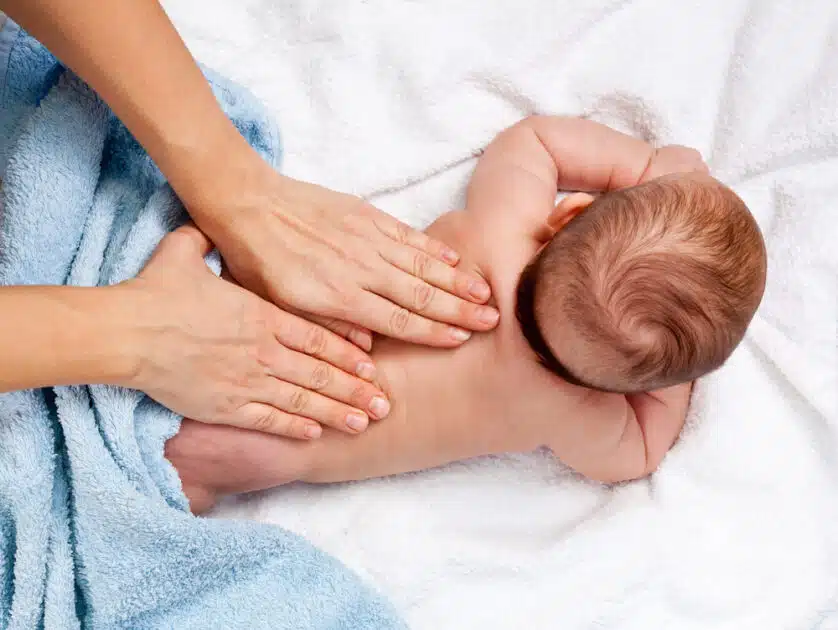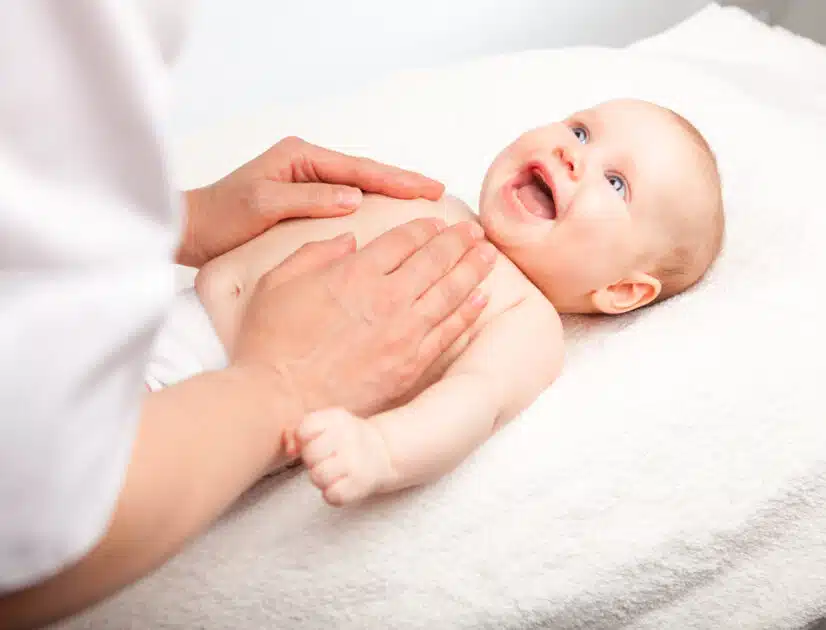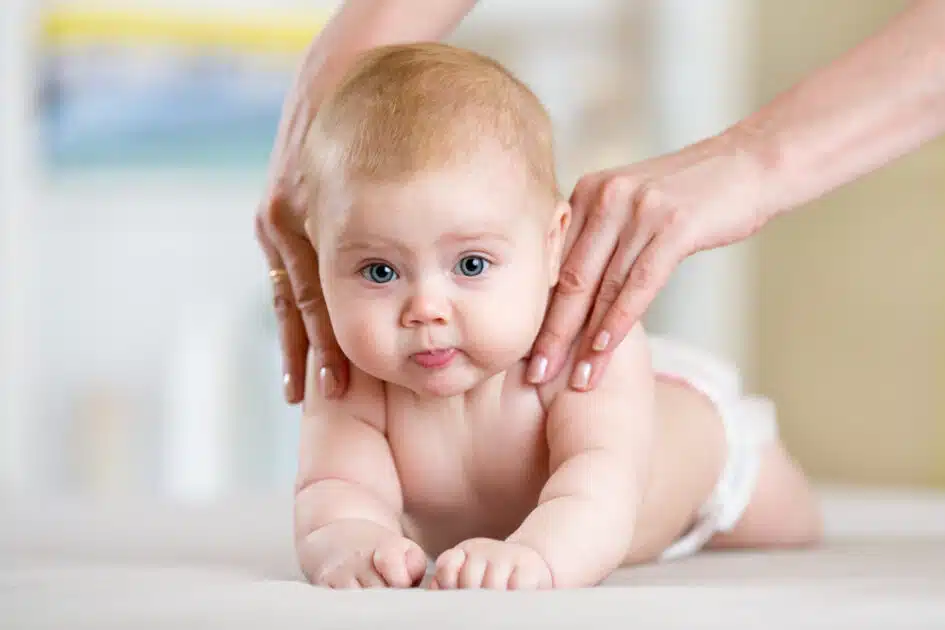Baby Massage

Infant Wellness: Exploring the Art and Science of Baby Massage
What is Massage 21st Jul, 2023
Baby massage, a centuries-old ritual in many cultures, signifies considerably more than a sweet gesture of affection.
This therapeutic technique has been shown to be an effective tool in molding newborns’ physical and mental health while also strengthening the basic relationship between parents and their children.

Modern research has continuously supported this old wisdom by revealing the numerous advantages that infant massages may provide. Let’s go deeper into the realm of infant massage, analyzing its advantages and learning how to include it into your baby’s care routine.
Embracing Baby Massage Practice
Incorporating baby massage into your daily routine can seem daunting initially. However, once you understand its many benefits and observe the positive effects firsthand, you’ll find it an irreplaceable part of your baby’s daily care.
The ideal time to massage your baby is when they’re calm, alert, and not immediately after a feeding. The use of a gentle, baby-safe oil can enhance the massage experience, although it’s essential to test it on a small patch of your baby’s skin beforehand to check for any allergic reactions.
Always consult your healthcare provider before starting a massage routine, as certain conditions may necessitate adjustments to the massage technique. Finally, remember that every baby is unique. Pay attention to your baby’s signals during the massage to ensure they are comfortable and enjoying the experience.
Finally, infant massage is a caring activity that strengthens the link between parents and their newborns while also increasing their general well-being. As you begin this enjoyable exercise, approach it with patience, compassion, and an open mind. Your kid will undoubtedly respond favorably to this gentle, loving care, paving the path for healthy growth and development.

Recommended:
Prenatal Massage Therapy: Enhancing Maternal Health and Well-being
Benefits of Baby Massage
Incorporating regular massages into your baby’s routine reveals a goldmine of benefits. The International Association of Infant Massage (IAIM) classifies these advantages into four broad categories: interaction, stimulation, relief, and relaxation.
1. Fostering Love and Connection
Baby massages foster unique bonding moments between parents and their children, laying the groundwork for a lifelong feeling of attachment, love, and trust. These early encounters are critical in developing important traits in your child, such as empathy and confidence.
Close touch creates an intimate setting in which parents may better grasp their baby’s nonverbal signs, resulting in improved communication. It allows parents to physically convey their love to their children while also making them feel safe and secure, therefore building the parent-child link.
2. Creating a World of Consciousness
One of the most striking benefits of baby massages is the stimulation it provides to all of your baby’s bodily systems. This includes their digestive, hormonal, immune, and circulatory systems, contributing to their overall health and vitality.
Beyond just physical health, massages help enhance your baby’s body awareness and sensory stimulation. It’s like providing them with a guided tour of their own body, enabling them to establish a connection with their physical self and the world around them. Over time, this heightened body awareness can lead to improved coordination and balance, playing a pivotal role in their motor skill development.
3. Relief
Babyhood brings with it a host of discomforts, including colic, constipation, teething pains, and growing pains. Thankfully, baby massage can serve as a gentle, natural remedy to soothe these discomforts.
Massage encourages the release of pain-relieving hormones and can help relax tense muscles. Parents might find that incorporating targeted massage techniques into their baby’s daily routine can provide substantial relief from common infant ailments.
4. Relaxation
Lastly, baby massages have a profound influence on relaxation and sleep patterns—for both infants and their parents. The gentle, rhythmic motion of a massage reduces the levels of stress hormones, promoting a sense of tranquility and peace.
Concurrently, it boosts the release of “feel-good” hormones such as oxytocin and serotonin, further enhancing the calming effect. The resultant tranquility can work wonders on sleep patterns, with studies suggesting that infants who receive regular massages may sleep deeper and more soundly.
This serene state is not confined to the baby alone; parents too can experience reduced stress levels and improved sleep, making baby massage a win-win scenario for the entire family.
In conclusion, infant massages have several advantages, ranging from strengthening the parent-child link and activating body systems to easing common discomforts and fostering relaxation. This simple exercise contains the secret to your child’s healthier, happier, and more harmonious start in life.
Baby Massage Journey: Your Essential Guide
There are a few things to consider before diving into the realm of infant massages. A few materials and a good grasp of when to massage your baby are required to set the setting for a safe and joyful infant massage.
Essential Baby Massage Supplies
Primarily, a comfortable, soft blanket or towel is necessary to provide a cozy surface for your baby during the massage. This surface should ideally be firm yet soft, offering enough support for your baby while ensuring their comfort.
Next, baby-safe massage oil is key. Select an oil that is specifically formulated for babies to ensure it’s gentle on their sensitive skin. This could be something as simple as organic, cold-pressed vegetable oils like coconut or olive oil, or a specially formulated baby massage oil from a reputable brand.
However, it’s crucial to test the oil on a small patch of your baby’s skin first, waiting at least 24 hours to ensure there’s no allergic reaction. Even oils that are generally safe can sometimes cause adverse reactions in some babies, so it’s best to err on the side of caution.
When to Massage Your Baby
After you’ve acquired your supplies, the following step is to decide when is the best time to massage your infant. You should ideally strive for a period when your infant is peaceful yet aware. This means not just after a meal, when they may be too full, or when they are too tired.
Choosing the proper time is critical for your baby’s enjoyment of the event. It’s also important to remember that newborns are independent beings with their own preferences. A morning massage may be enjoyed by some, while others may prefer it as a pre-bedtime relaxing routine. Paying attention to your baby’s cues will assist you in developing a schedule that works for both of you.
Health Considerations
It’s also important to consult your healthcare provider before introducing a baby massage routine. While massages are generally safe and beneficial for most babies, there might be special considerations if your baby has a specific health condition. Your pediatrician can provide guidance tailored to your baby’s unique needs, ensuring the massage experience is safe, beneficial, and enjoyable for your little one.
Always remember, the goal of baby massage is to foster a deeper bond with your baby, aid their development, and provide them with comfort and relaxation. With the right preparations, your baby massage routine can become a cherished part of your daily life, reaping benefits for both you and your little one.

Safety Tips for Baby Massage
Mastering the art of baby massage is not about perfecting techniques, but rather about fostering an environment of love, trust, and comfort. Ensuring that your baby’s massage routine is safe, enjoyable, and beneficial requires following some crucial guidelines. Here’s an extended list of tips to help you optimize the benefits of baby massage:
1. Timing Matters
It’s advisable not to massage your baby immediately after a meal. Allow at least 45 minutes to an hour after feeding to avoid discomfort or risk of regurgitation. It’s essential to tune into your baby’s natural rhythms and choose a time when they’re typically calm, alert, and content.
2. Gentle Yet Firm Touch
Your touch should be gentle enough to be comforting, yet firm enough not to tickle. Always make sure your hands are warm, and your strokes are slow, rhythmic, and predictable. Remember that the pressure you apply should be proportionate to the delicacy of your baby’s body.
3. Consistent Routine:
Try to incorporate massage into your baby’s daily schedule. Consistency can help your baby recognize the massage as part of their routine, increasing the comfort level and effectiveness of the practice. Whether you opt for mornings, afternoons, or evenings, maintaining a set schedule can enhance the relaxing effect of the massage.
4. Baby’s Consent and Comfort
Pay keen attention to your baby’s signals. If your baby seems to squirm, cry, or appear uncomfortable at any point during the massage, it’s best to stop and try again at a later time. Respect your baby’s cues; consent is important even at this early stage of life.
5. Safe Massage Oils
Always consult your doctor or pediatrician before using any massage oils on your baby’s delicate skin. Opt for oils specifically designed for babies, or use natural oils like coconut or olive oil, after doing a patch test to rule out any allergic reactions.
6. Calm Atmosphere
The environment in which you perform the massage plays a crucial role in setting the mood. Ensure the room is comfortably warm, quiet, and free from distractions. Use this time to engage with your baby through eye contact, soothing voices, and even gentle singing or humming.
7. Your Relaxation Matters Too
Your mood and relaxation level can influence the experience. Stay relaxed and maintain a calm demeanor to help your baby feel safe and loved. Remember, baby massage is not just a nurturing activity for your little one, but also a bonding experience for you both.
By adhering to these tips, you can turn baby massage into a delightful and enriching ritual, one that strengthens the bond between you and your baby while contributing positively to their holistic growth and development.

Recommended:
What is Occupational Therapy? For Parents and For Kids
The Bottom Line
Infant massage is more than a wellness routine — it’s a meaningful practice with numerous benefits for a baby’s physical, emotional, and psychological well-being. When parents massage their baby gently, it brings instant comfort and lasting effects, such as improved growth, better sleep, and bonding.
This practice adjusts to the baby’s mood and needs, allowing parents to actively engage in their child’s development while expressing love and care in a hands-on way. The special connection formed between parents and babies through massage is built on trust, empathy, and compassion, setting the stage for a lifelong relationship.
FAQs
When should you start massaging your baby?
Start massaging your baby from birth, but wait until after the first week to allow for healing and settling into a routine.
Is it OK to massage the baby every day?
Yes, it’s safe and beneficial to massage your baby every day, promoting relaxation, better sleep, and bonding.
Should I massage my baby before or after a bath?
You can choose either, but massaging before a bath relaxes the baby, while after a bath lock in moisture.
What are the disadvantages of baby massage?
When done right, there are few disadvantages, but be cautious with pressure and use baby-friendly products to avoid skin irritation.
Which thing is best for baby massage?
Choose natural, baby-friendly oils like coconut oil or almond oil for the safest and most effective baby massage.
















